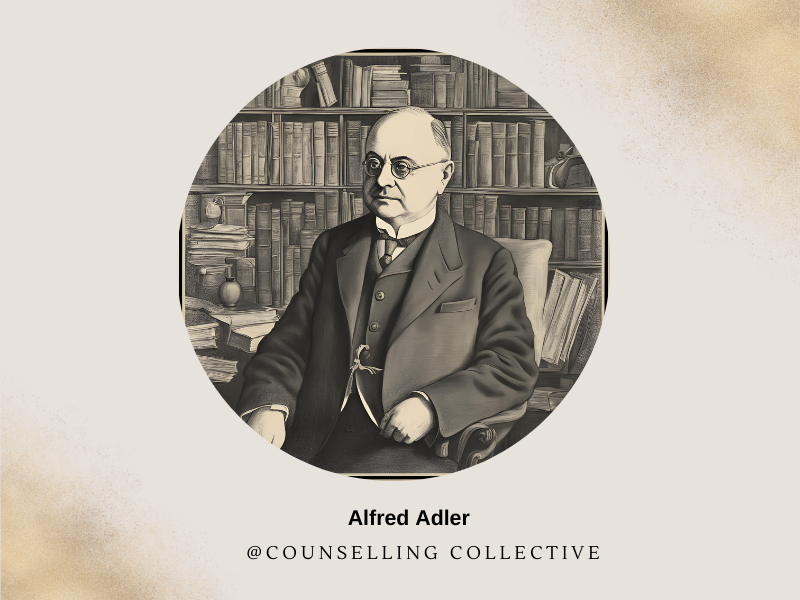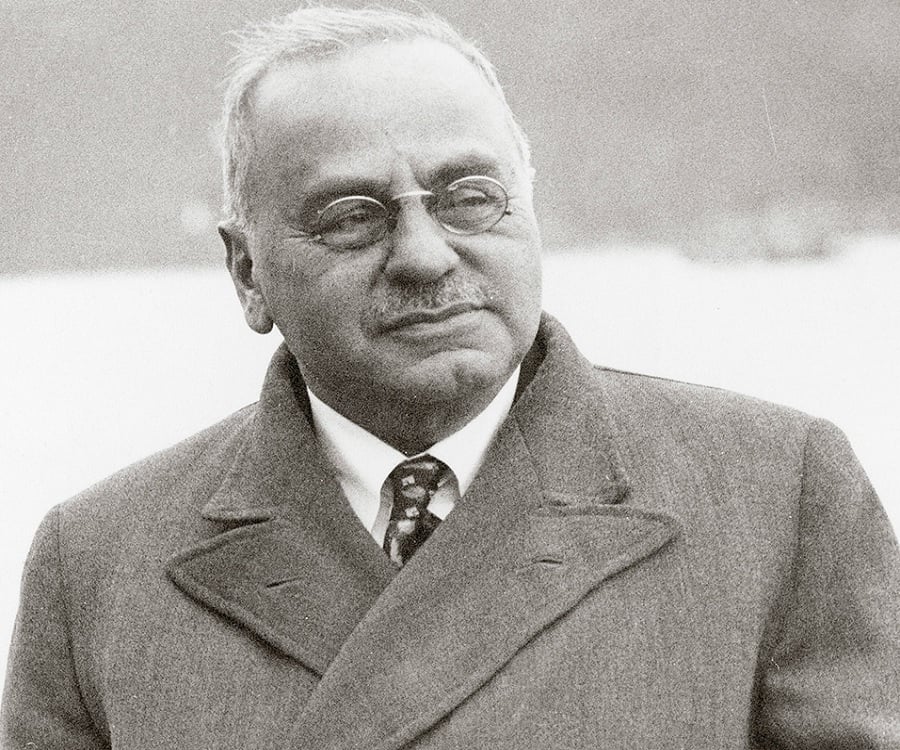Contents
Introduction
Alfred Adler was an influential Austrian psychologist and psychiatrist, best known for founding the school of Individual Psychology. His work significantly diverged from his contemporary, Sigmund Freud, emphasizing the uniqueness of the individual and the importance of social factors in shaping personality. Adler’s theories on inferiority complex, striving for superiority, and social interest have left an enduring mark on psychology and psychotherapy (Adler, 1927).

In this article, we will Analyze Alfred Adler’s pioneering contributions to psychology, focusing on his development of Individual Psychology. We’ll Study into his theories of the inferiority complex, striving for superiority, and the role of social interest, and examine how these ideas diverged from Freudian concepts and influenced modern psychotherapy. Explore more psychologists here
Early Life and Education
Alfred Adler was born on February 7, 1870, in the suburbs of Vienna, Austria, into a middle-class Jewish family. As the second of seven children, Adler’s early years were fraught with challenges that would shape his future theories. He suffered from rickets, which delayed his ability to walk until he was four, and he nearly died from pneumonia at the age of five. These early health struggles instilled in him a deep sense of vulnerability and inferiority, which later influenced his psychological theories on overcoming adversity (Hoffman, 1994).
Image Source: thefamouspeople.com

Growing up, Adler was not a particularly outstanding student. He faced many academic challenges and was often overshadowed by his older brother, Sigmund. Despite these setbacks, his determination and resilience began to manifest. Adler’s early life was also marked by a significant event: the death of his younger brother, Rudolf, which left a profound impact on him. He later described this loss as a pivotal moment that fueled his drive to understand human behavior and the psychological impact of life events (Hoffman, 1994).
Educational Journey
| Aspect | Details |
| Early Education | Adler attended primary and secondary school in Vienna, where he struggled academically but showed an early interest in understanding human behavior. |
| University of Vienna | He pursued a medical degree at the University of Vienna, graduating in 1895. Initially specializing in ophthalmology, he soon switched to general practice (Ansbacher & Ansbacher, 1956). |
| Job | After graduating, Adler worked as an ophthalmologist before transitioning to general practice, where he encountered a wide variety of patients. |
| Research | His interactions with patients in general practice spurred his interest in psychiatry and psychology, leading him to join Freud’s Vienna Psychoanalytic Society in 1902 (Ansbacher & Ansbacher, 1956). |
Timeline of Early Influences
| Aspect | Details |
| Immanuel Kant | Adler was influenced by Kant’s philosophy, particularly the ideas of duty and moral imperatives, which shaped his understanding of ethical behavior (Ansbacher & Ansbacher, 1956). |
| Charles Darwin | Darwin’s theory of evolution and natural selection influenced Adler’s views on human development and the importance of adaptation and overcoming challenges (Adler, 1927). |
| Vienna Psychoanalytic Society | Joining Freud’s society exposed Adler to psychoanalytic ideas, but he soon diverged due to differing views on the primary motivators of human behavior (Adler, 1927). |
| Medical Practice | His work as a general practitioner provided him with firsthand experience of the psychological impacts of physical ailments and social conditions (Ansbacher & Ansbacher, 1956). |
Major Theories and Works

Individual Psychology
Adler’s most significant contribution to psychology is his development of Individual Psychology, which emphasizes the holistic nature of the individual and the importance of social context. Unlike Freud, who focused on the unconscious mind and sexual drives, Adler believed that human behavior is primarily motivated by social influences and the drive to achieve personal significance and superiority (Adler, 1927).
- Social Interest and Community Feeling: Adler emphasized the importance of belonging and contributing to society, believing that strong social connections and a focus on others’ well-being are key to a healthy personality.
- Inferiority Complex: Adler introduced the concept of the inferiority complex, where feelings of inadequacy drive individuals to strive for success, often overcompensating to overcome perceived deficiencies.
Image Source: psychodynamicandanalytic.weebly.com

Inferiority Complex
One of Adler’s key concepts is the inferiority complex, which refers to feelings of inadequacy and insecurity that arise from perceived weaknesses or failures. According to Adler, these feelings of inferiority can significantly influence an individual’s behavior and development. The concept can be expanded as follows:
- Compensation and Overcompensation: Adler suggested that individuals compensate for inferiority by striving for success, which can lead to growth or, in overcompensation, result in arrogance and aggression.
- Impact on Relationships: The inferiority complex can affect interpersonal relationships, leading to difficulties in social interactions. Individuals may either withdraw due to feelings of inadequacy or become overly competitive, striving to prove their worth to others.
Image Source: quora.com

Striving for Superiority
Closely related to the inferiority complex is Adler’s concept of striving for superiority. He proposed that individuals are driven by an innate desire to overcome their limitations and achieve their full potential. However, when the pursuit of superiority becomes exaggerated or misdirected, it can lead to destructive behavior and conflict. This drive can manifest in various forms:
- Potential Pitfalls: However, when the pursuit of superiority becomes exaggerated or misdirected, it can result in destructive behavior, such as arrogance, dominance, or conflict with others, disrupting relationships and personal well-being (Adler, 1927).
- Personal Ambition: Individuals channel their striving into personal achievements, seeking to excel in areas they value, whether in career, academics, or personal development.
Image Source: academyofideas.com

Social Interest
Adler introduced the idea of social interest (Gemeinschaftsgefühl), which refers to an individual’s sense of belonging and contribution to the community. He viewed social interest as a key indicator of mental health and well-being, emphasizing its role in fostering cooperation and empathy. According to Adler: (Adler, 1927).
- Role in Personal Fulfillment: Adler believed that true personal fulfillment comes not just from individual achievements but from contributing to the welfare of others.
- Foundation of Social Harmony: Social interest is essential for creating and sustaining social harmony. Individuals with strong social interest are more likely to engage in cooperative behaviors, showing empathy, respect, and a willingness to contribute to the common good.
Image Source: goodtherapy.org

Birth Order Theory
Adler explored the impact of birth order on personality development, theorizing that an individual’s position within the family (e.g., first-born, middle child, youngest) significantly influences their behavior, attitudes, and life choices. Key aspects of his theory include:
- First-Born Children: Often responsible and achievement-oriented, with a strong sense of duty.
- Middle Children: Adaptable and diplomatic, may feel overshadowed but develop a unique identity.
- Youngest Children: Sociable and creative, might develop dependency or a competitive edge.
- Only Children: Share traits with first-borns, such as maturity and responsibility, but may also exhibit perfectionism.
Image Source: calmsage.com

The Neurotic Character
In The Neurotic Character, Adler explores how neurosis develops from feelings of inferiority and compensatory behaviors. Key aspects include:
- Foundational Concepts: This work established Adler’s reputation in early psychoanalytic thought and introduced key concepts, such as social interest and the drive for superiority (Adler, 1912).
- Feelings of Inferiority: Adler believed that neurosis often arises from deep-seated feelings of inadequacy or inferiority, linked to personal weaknesses or perceived failures.
- Compensatory Behaviors: To overcome these feelings, individuals may engage in compensatory behaviors, such as excessive ambition or seeking validation, which can lead to neurotic traits.
Image Source: medicalnewstoday.com

Understanding Human Nature
Provides a comprehensive overview of Adler’s theories, including his views on personality development, social interest, and the importance of understanding individual context. covering essential aspects such as: (Adler, 1927).
- Practical Applications: Regarded as one of Adler’s most accessible and influential works, it provides practical insights into applying his theories in everyday life, offering valuable guidance for personal growth and therapeutic practices (Adler, 1927).
- Personality Development: Adler explores how personality develops through interactions with others and the influence of early childhood experiences, emphasizing the role of social context.
Image Source: Pacific Press
Psychologists Influenced by Adler

- Rollo May – An American existential psychologist, May was influenced by Adler’s emphasis on individuality and the social context of human behavior. He integrated these ideas into his existential approach, focusing on the human experience and the challenges of existence (May, 1983).
- Carl Rogers – A leading figure in humanistic psychology, Rogers was inspired by Adler’s belief in the individual’s potential for growth and self-actualization. Rogers’ client-centered therapy emphasizes empathy, unconditional positive regard, and the therapeutic relationship (Rogers, 1961).
- Karen Horney – A psychoanalyst who broke away from Freudian orthodoxy, Horney’s theories on neurotic needs and basic anxiety were influenced by Adler’s ideas on inferiority and striving for superiority. She emphasized the role of social and cultural factors in personality development (Horney, 1937).
- Viktor Frankl – The founder of logotherapy, Frankl was influenced by Adler’s concepts of purpose and meaning in life. His work focuses on finding meaning through suffering and the importance of individual responsibility (Frankl, 1963).
- Abraham Maslow – Known for his hierarchy of needs, Maslow was influenced by Adler’s focus on human potential and self-actualization. Maslow’s work emphasized the importance of fulfilling one’s potential and achieving self-actualization (Maslow, 1954).
Impact on Psychology
Influence on Modern Thought
Adler’s ideas have had a profound impact on various fields within psychology, including psychotherapy, counseling, and educational psychology. His holistic approach to understanding the individual and his emphasis on social factors have influenced many subsequent theories and therapeutic practices (Ansbacher & Ansbacher, 1956).
Contributions to Related Fields
Adler’s concepts have extended beyond psychology to influence fields such as sociology, education, and organizational behavior. His emphasis on social interest and community well-being has informed approaches to social work and community psychology, while his insights into motivation and leadership have been applied in organizational settings (Hoffman, 1994). Adler’s holistic approach to understanding individuals within their social context has also influenced educational practices, particularly in the areas of classroom management and student motivation.
Controversies and Criticisms
While Adler’s theories have been widely influential, they have also faced criticism. Some scholars argue that his concepts, such as the inferiority complex and striving for superiority, are too broad and lack empirical support.
Additionally, his break with Freud and subsequent marginalization within the psychoanalytic community led to his work being overshadowed by other prominent figures in psychology. However, recent years have seen a resurgence of interest in Adler’s contributions, with many recognizing the relevance and applicability of his ideas in contemporary psychological practice (Hoffman, 1994).
Legacy and Influence
- Long-Term Impact: Alfred Adler’s legacy endures through his lasting contributions to psychology and his influence on subsequent generations of therapists and researchers. His holistic approach to understanding the individual and his emphasis on social context have become integral components of modern psychological practice. Adlerian therapy continues to be practiced worldwide, with numerous training institutes and professional organizations dedicated to promoting and advancing his ideas (Ansbacher & Ansbacher, 1956).
- Recognition and Honors: Although Adler did not receive the same level of recognition as some of his contemporaries during his lifetime, his contributions have been increasingly acknowledged in recent decades. Professional organizations, such as the North American Society of Adlerian Psychology (NASAP), continue to honor his legacy through conferences, publications, and educational programs.
Conclusion
Alfred Adler’s life and work have profoundly shaped the field of psychology and beyond. His theories on inferiority complex, striving for superiority, and social interest offer valuable insights into human behavior and personality development. As we continue to explore and apply his ideas, Adler’s legacy endures, reminding us of the importance of understanding the individual within their social context.
Bibliography
- [1] Adler, A. (1912). The Neurotic Character. Retrieved from link.
- [2] Adler, A. (1927). Understanding Human Nature. Retrieved from link.
- [3] Adler, A. (1924). The Practice and Theory of Individual Psychology. Retrieved from link.
- [4] Ansbacher, H. L., & Ansbacher, R. R. (1956). The Individual Psychology of Alfred Adler: A Systematic Presentation in Selections from His Writings. New York: Basic Books.
- [6] Frankl, V. E. (1963). Man’s Search for Meaning: An Introduction to Logotherapy. Boston: Beacon Press.
- [7] Hoffman, E. (1994). The Drive for Self: Alfred Adler and the Founding of Individual Psychology. Addison-Wesley.
- [8] Horney, K. (1937). The Neurotic Personality of Our Time. New York: W.W. Norton & Company.
- [9] Maslow, A. H. (1954). Motivation and Personality. New York: Harper & Row.
- [10] May, R. (1983). The Discovery of Being: Writings in Existential Psychology. New York: W.W. Norton & Company.
- [11] Rogers, C. R. (1961). On Becoming a Person: A Therapist’s View of Psychotherapy. Boston: Houghton Mifflin.






